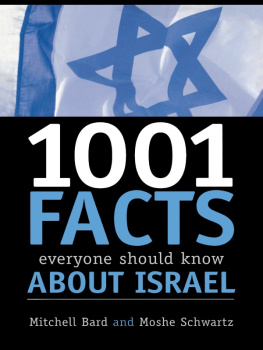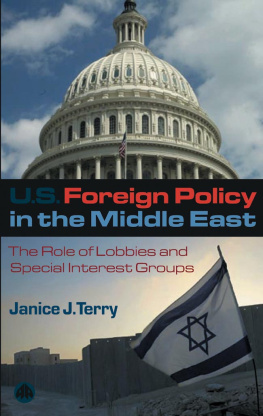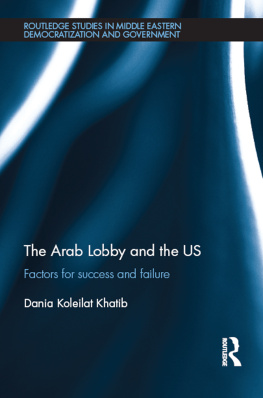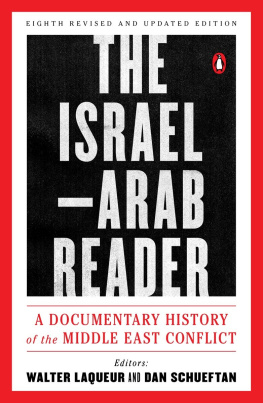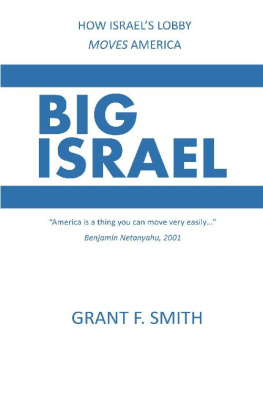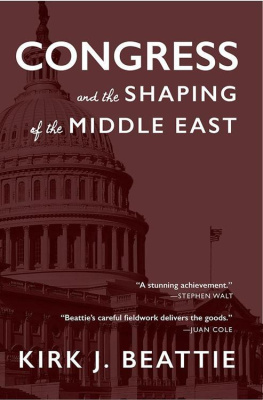D uring the 2008 presidential campaign, Barack Obama made clear that one component of his agenda would be to give a high priority to pursuing Arab-Israeli peace. Many Jews had some concerns about Obama, but his pro-Israel statements reassured them, and ultimately nearly 80 percent voted for him. Obamas appearance before the pro-Israel lobby, the American Israel Public Affairs Committee (AIPAC), and recitation of talking points from the Israeli lobby playbook were consistent with the popular view of a powerful lobby that demands the fealty of elected officials.
Within a few weeks of taking office as the nations forty-fourth president, however, Obama seemed to pick a fight with the Israeli government over its settlements policy. He began to publicly demand that Israel freeze all settlement activity. When Israeli officials brought up the fact that certain understandings had been reached with Obamas predecessor regarding what the United States considered to be acceptable construction, Secretary of State Hillary Clinton denied any such agreements had been made.
In July 2009, Obama invited a group of Jewish leaders to the White House who were content to hear the presidents views and asked only that he refrain from public criticism. Obama made clear he would do no such thing.
Israelis tried to steer the administration away from the settlement issue toward what they believed was the most urgent threat to their nation and the stability of the region, namely, the Iranian nuclear program. Obamas chief of staff, Rahm Emanuel, coincidentally a Jew whose father is Israeli, said that the Israeli-Palestinian issue was the crux of solving the Iranian threat. Administration officials argued that the only way they could get Arab states to cooperate in the effort to stop the Iranian program was to solve the Palestinian issue.
Meanwhile, Obamas first interview as president was with an Arab publication, and his first trip to the Middle East omitted Israel and was highlighted by a speech in Cairo that was meant to reach out to the Muslim world. Ten months into his term, he still had not visited Israel, and the persistent public criticism by his administration had reduced the percentage of Israelis who considered him a friend of Israel to a shockingly low 4 percent.
Thus, in less than a year, President Obama had created what appeared to be a crisis with his only democratic ally in the region while doing everything in his power to curry favor with the Arab and Muslim world. After eight years of feeling encumbered, the foreign policy establishment found an ally in the White House who shared their long-standing view that Americas Middle East policy can best be served by cultivating relations with the Arabs and, concomitantly, distancing the United States from Israel.
The Obama policy, however, seems to fly in the face of the conspiracy theorists who have long believed in an all-powerful Jewish/Israeli lobby that controls U.S. Middle East policy to the detriment of the national interest.
How can this be explained?
The following pages will show that U.S. policy is not controlled by an omnipotent Israeli lobby but rather heavily influenced by an equally potentyet much less visibleArab lobby that is driven by ideology, oil, and arms to support Middle Eastern regimes that often oppose American values and interests.
It is understandable if this statement is surprising, given that few books or articles examine the Arab lobby, while there is a long history of conspiracy theories suggesting that Jews control everything from the media to the U.S. Congress to the global financial system. The Israel Lobby , by Stephen Walt and John Mearsheimer, is the most recent screed to reinforce such beliefs.
Israels detractors have embraced Walt and Mearsheimers book because its argument fits in neatly with their fantasies about an all-powerful group of Jews who control U.S. foreign policy, but they should be offended by the racist, paternalistic tone of the book, which portrays the Arabs as impotent, unable to affect their own fate or influence U.S. actions. While the Israeli lobby is obsessively scrutinized, mischaracterized, and demonized, the role of the Arab lobby is denied, minimized, or ignored.
Why write a book about this subject now? One reason is the publicity given to the distorted portrayal of the Israeli lobby by Walt, Mearsheimer, and others. Also, this is a time when the Arab lobby has been engaged in an increasingly successful global campaign to delegitimize and ostracize Israel. Most important, though, it is a story that has never been told and must be exposed so the public understands the extent to which the Arab lobby seeks to manipulate American foreign policy. This book will illustrate that an Arab lobby does exist and that the Arab-Israeli conflict is fought in the Oval Office, Congress, the media, and campus quads and classrooms. This is not just a war of ideas but one that involves the security of the United States. Americans should understand what the Arab lobby is, how it operates, and why it is dangerous.
To be fair, Walt and Mearsheimer are not the only ones who give short shrift to the Arab lobby. For example, when DePaul professor Khalil Marrar contacted Arab American organizations to interview their representatives for his research on the subject, he was told, There is no Arab lobby in Washington, DC. In the Foreign Affairs Oral History Project of the Association for Diplomatic Studies and Training, former State Department officials who dealt with Middle East affairs were repeatedly asked about the Israeli lobby, but the Arab lobby was never discussed.
Walt and Mearsheimer do not subject the Arab lobby to the same analysis they apply to the Israeli lobby; they simply dismiss its influence. Claiming that oil companies have not exerted influence, they conclude that their case is proven. They also suggest that if an influential Arab lobby did exist, it would try to distance the United States from Israel. They are correct and this book will show this is one of the lobbys principal objectives. While they cite research I did more than twenty years ago for my PhD dissertation that showed the comparative advantage of the Israeli lobby, I have used the intervening years to study the Arab lobby and offer new evidence here of its influence.
Unlike many of the Israeli lobbys detractors, I do not suggest that Arab Americans or supporters of the Arab cause have no right to pursue their agenda. In a democracy, every group has the right to lobby and to make its case to the public and decision makers; the marketplace of ideas should decide which arguments have the most merit. The point of this study is to highlight how the debate may be distorted because of the vast financial resources of the Arab lobby, and to expose some of its efforts to manipulate public opinion and foreign policy, often beyond public view, in ways that have gone largely unnoticed and demand greater scrutiny. More specifically, I will demonstrate how the Arab lobby exerts a malign influence on U.S. policy that has led successive administrations to ignore fundamental American values in order to bolster repressive Arab regimes, in particular Saudi Arabia; how the lobby has undermined Americas security through the support of terrorists and others acting contrary to U.S. interests; and most alarmingly, perhaps, how it has infiltrated the education system in an effort to create a distorted understanding of Islam and the Middle East and weaken support for the U.S.-Israel relationship.
This book also aims to expose how one foreign government, Saudi Arabia, seeks to influence U.S. Middle East policy. As in the case of Arab Americans, the Saudis have the right to do so; every country uses diplomacy, and sometimes American consultants and foreign agents, to advance its interests in Washington. But Saudi Arabia is notable for the magnitude of its campaign at every level, from primary school education to universities to the media to the Congress and White House. More important, the Saudi component of the Arab lobby consistently acts against U.S. interests and frequently undermines them. In particular, the Saudis are active sponsors of international terrorism, the main exporters of radical Islam, and the rulers of one of the worlds most intolerant societies.



